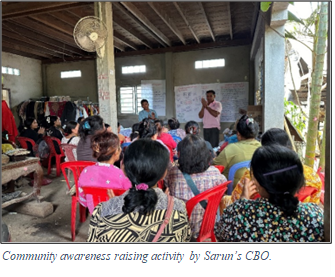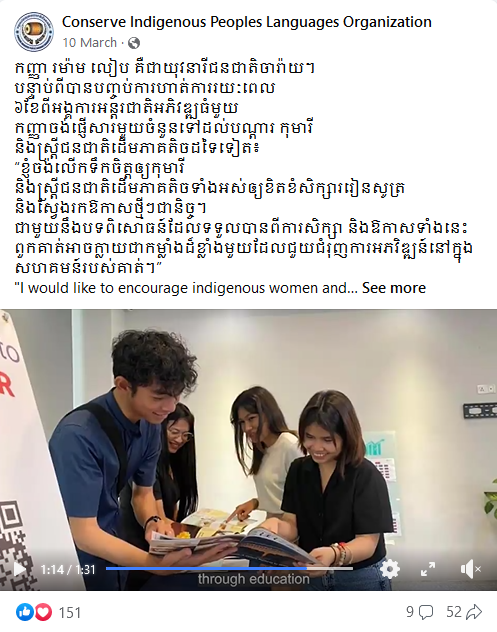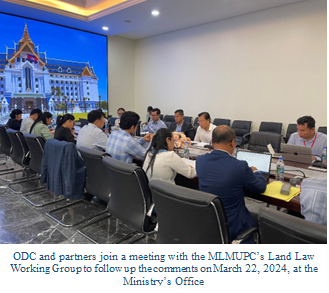Mr. Oeun Sarun is a 71-year-old CBO leader in Thmey village, Bansay Treng commune, Thmor Kol district, Battambang province. He leads a CBO called “Sahakum Morodak Phum Thmey,” which was selected as one of the cluster members in the Together for Gender Justice (T4GJ) project in October 2022.

Mr. Oeun Sarun is a 71-year-old CBO leader in Thmey village, Bansay Treng commune, Thmor Kol district, Battambang province. He leads a CBO called “Sahakum Morodak Phum Thmey,” which was selected as one of the cluster members in the Together for Gender Justice (T4GJ) project in October 2022.
Similar to other CBO leaders participating in the T4GJ project, Mr. Sarun facilitated community meetings to share knowledge and understanding of sexual harassment so that participants can further spread the knowledge to the family and neighbors. In his own time, he also continuously disseminated his knowledge to his neighbors and friends as well. He observed that his family and community gradually changed their thinking on sexual harassment, by reflecting on what they did in the past and how they can prevent it now and in the future.
Similar Stories
CSS’s Intern Romam Leap shares her internship experience
CSS produced a short video to highlight the internship experiences of former communications intern and Jarai indigenous youth Romam Leap. The video was very well received by the public on social media, generating approximately 150 reactions, 52 shares, and 2,700 views on Facebook
The more the merrier: Incorporating inputs into the draft land law
The ODC\'s Civil Society Support Activity: Cluster Anchor Grant initiative demonstrates the value of collaborative advocacy and strategic participation in achieving legislative reforms that benefit society. ODC\'s path, which focuses on promoting meaningful engagement in natural resource management and building social inclusion, shows devotion, determination, and effective action. Our effort ensures that the voices of communities, Community-Based Organizations (CBOs), and Civil Society Organizations (CSOs) are not only heard but also integrated into the drafting process of the Land Law, which governs land rights and management in Cambodia. In January 2024, ODC began the process by formally requesting the draft Land Law from the Ministry of Land Management, Urban Planning, and Construction (MLMUPC), paving the way for collaborative involvement. When ODC received the draft Land Law in February 2024, its team immediately began mobilizing efforts. ODC organized coordinated events and dialogues to promote extensive consultations and discussions, involving stakeholders at both the sub-national and national levels. Working with legal experts, ODC ensured that the complexity of the legislation was clarified, allowing for involvement and informed input from the grassroots to the national level. ODC\'s collaborative efforts paid off, as we had inputs that reflected diverse viewpoints. With 60 pages of the matrix comments, ODC submitted its inputs to the Ministry within a tight timeframe (February 16), demonstrating its commitment to constructive participation and lobbying. Beyond the submission, ODC realized the value of ongoing communication and advocacy. Addressing gender equality in land ownership and encouraging continuous talks among CSOs, ODC highlighted concerns and options for future engagement with the Ministry. ODC\'s proactive approach resulted in a follow-up meeting request, indicating its commitment to ensure that ODC\'s inputs are not just recognized but also included in the legislative process. “Thank you! I appreciate the inputs and comments from the CSOs on the Draft Land Law. If the government asks the consultant to do it, it might take a million dollars to do so”, H.E. THENG Chan-Sangvar, Secretary of State and MLMUPC’s Land Law Working Group. The impact of ODC\'s combined efforts was clear when the Ministry acknowledged and integrated more than 15 points from ODC\'s submission, indicating a significant step toward inclusive policymaking. While ODC\'s efforts are not always directly acknowledged, the realization of their combined impact emphasizes the significance of ongoing lobbying and collaborative participation. Contributing to the new draft Land Law, ODC remain committed to working for communities\' rights and interests. Armed with knowledge, unity, and a common vision for a more fair and equitable society, ODC are prepared to face the challenges ahead, confident in its power to affect significant change through collective action.
Renewed purpose: Raising awareness on sexual Harassment one community at a time
Sinath is a leader of a commune-based organization (CBO) in her community. She started volunteering with Banteay Srei in 2008. Sinath wasn’t always very confident and active in her community. Living in a small community, Sinath faced pressures related to societal and family norms, stereotypes, and judgements. She took on traditional roles of taking care of her children, husband, and in-laws and didn’t feel brave enough to socialize outside the house and attend village activities or meetings. After becoming a volunteer with BS, Sinath had more opportunities to attend different events with BS. Those events – meetings, trainings, public forums, study tours – in her province and beyond have helped her to build knowledge and experience. Now, Sinath has a better understanding of leadership and her self-worth. She has also gained new skills such as public speaking, communications, planning, business, community mobilization, and facilitation. Sinath continues to equip herself with new knowledge and skills. In 2023, she learned and gained new knowledge from BS on sexual harassment. Sinath is a member of one of the five CBOs selected by BS to receive sexual harassment training. Sinath finds this new knowledge very important for her and other women in her community. After the training, she is able to recognize different types of harassment as well as harmful and discriminatory jokes often made by people around her. Sinath believes that lessons on sexual harassment can help men to understand and cease their discriminatory behavior that leads to sexual harassment. After the training, she has applied what she learned in her daily life and among her monthly saving group that she belongs to. Her peers showed a lot of interest in the subject and expressed that this would help them shift their perception and inspire some positive changes in their daily lives. For the future, Sinath plans to advocate on the issue of sexual harassment in her village by using operational funds received from Village Savings/Credit Group program. Along with the advocacy effort, she also plans to raise awareness on other topics such as importance of educating children, the impact of young marriage, gender-based violence, leadership, and positive thinking.


